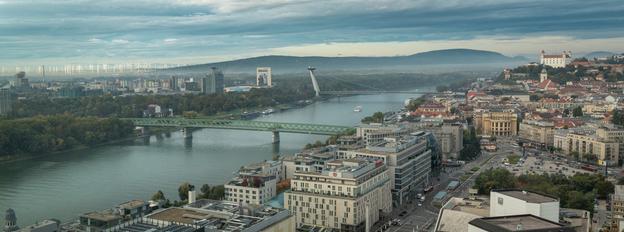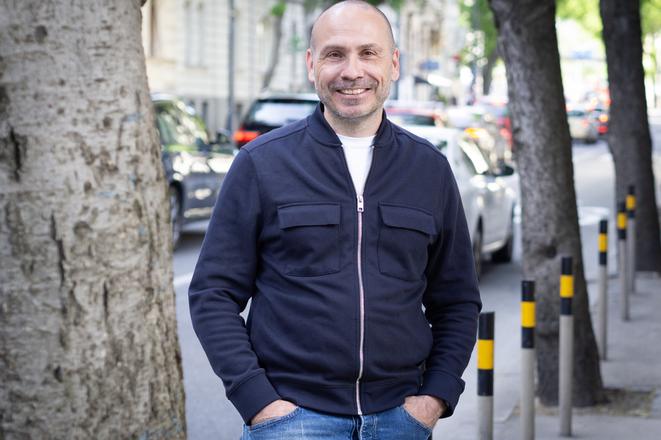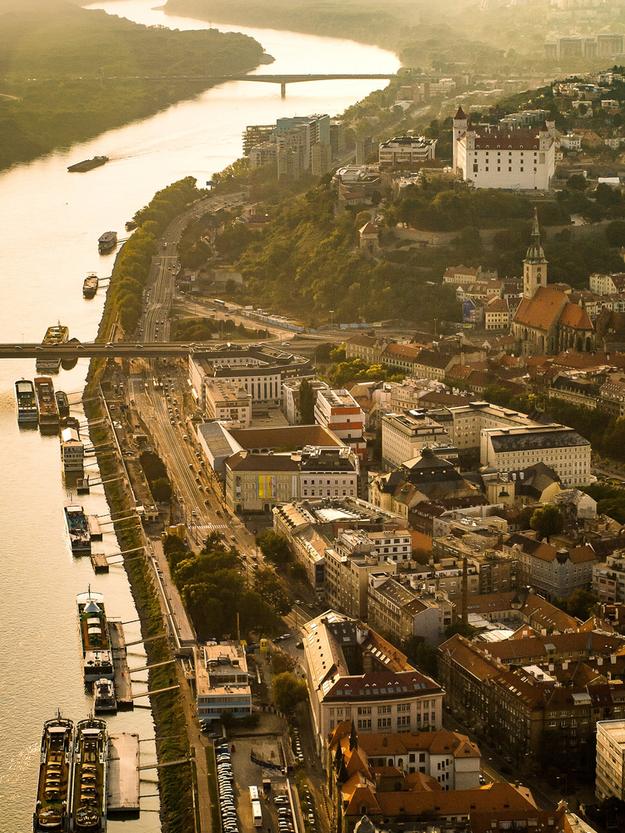He says he does not understand his country, but he understands his city. He does not want to spend his life ranting about it. Photographer, journalist and author of the book "Bratislava, Moja Láska" (Bratislava, My Love), ANDREJ ĎURÍČEK, sheds light on controversies, unmasks legends, looks for connections in the history, politics and our nature.
By doing this, he is aware of getting into disputes with people who like to hate the city they have moved to, as well as those who tell themselves they are real Bratislavans. He sees many things in the city as absurd, and he also provides examples when Bratislava residents cry over things that were not as valuable as they thought and when they reject changes without reason.
 The panorama of Bratislava. CLICK TO ENLARGE. (source: Andrej Ďuríček)
The panorama of Bratislava. CLICK TO ENLARGE. (source: Andrej Ďuríček)
Haters say that Bratislava is a village with traffic lights. What do you think of such an opinion?
Say what you will about Bratislava, but it is the capital of the Slovak Republic, thus the capital of all its citizens. It is a shame when someone hates it. Of course, by European standards it is not a big city, but if I wanted to be mean, I would say that apart from Bratislava, there is only one city left - Košice. The rest are villages.
Bratislava's size is probably not what people mean by that.
Yes, I know what you are saying. In recent years, 100,000 new people have come to the capital and its hinterland. They lived, started families, found work here. This is how it should be. But among them are those who, having spent 20 years in Bratislava, say that they are going home for the weekend. Although they have lived here for many years, they do not feel at home here, and this is also reflected in their relationship with the city. As if someone is forcing them to stay in disgusting Bratislava, as if someone is forcing them to live, have a job and start a family there. I would not enjoy feeling like a stranger somewhere, in a hated environment.
Is there something characteristic of Bratislavans?
Who is a Bratislavan? What I see around me is that a kind of new elite is emerging, which is proud of its origin. We are old residents, they say. I could say that too, but then I find out that both my great-grandmothers came here from Vienna after the First World War. So this kind of boasting of a genuine Bratislava family tree is foreign to me.
They are probably proud of having experienced when Bratislava had three cultures: Slovak, Hungarian and German.
Today, however, Bratislava has many more cultures. It is more colourful than it used to be. And why is it good to keep returning to the past? To some extent, I sometimes rant as well. I am not happy that the Stein brewery, Istropolis [the former House of the Trade Unions originally designed to host the congresses of the Communist Party – ed.] were demolished. This is the disease of this city and the nation. I do not like that we always want to start from scratch. During the first republic we allowed the statue of Maria Theresa to be torn down, after the Velvet Revolution the statue of [Klement] Gottwald [the first leader of communist Czechoslovakia - ed.] on Námestie Slobody square was removed. We remove all symbols, as if to free ourselves from our past. But this does not free us in any way, we only lose awareness of our story. We remove, we forget and then we do not know. On the other hand, I understand that the city needs to change and develop.
Sometimes it is difficult to distinguish whether a building has historical value, or whether a certain generation associates it with memories of its youth.
Whenever Bratislava is mentioned, some controversy arises to the surface. It is common to say that the Jewish neighbourhood of Vydrica, and Zuckermandel were demolished to build Most SNP bridge. It sounds brutal. But the bridge, and the Bystrica restaurant on top is one of Bratislava's most iconic symbols. What communists demolished they also replaced with something new and, let's face it, of high quality. You just do not see something like that today. The PKO complex is a different case. How many years have passed since it was demolished? And nothing is there. The communists are not the only ones at fault. The system that followed has also caused damage. I document it on my Bratislava, My Love blog.
What do you mean by the damage?


 Photographer Andrej Ďuríček. (source: SME - Kristína Kúdelová)
Photographer Andrej Ďuríček. (source: SME - Kristína Kúdelová)
 The photo of Bratislava from the book "Bratislava, My Love". (source: Andrej Ďuríček)
The photo of Bratislava from the book "Bratislava, My Love". (source: Andrej Ďuríček)